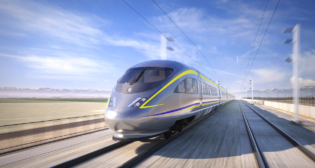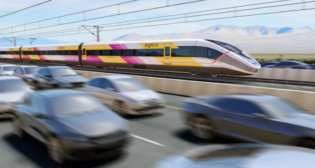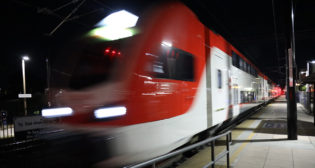
What’s in a name? Don’t ask Amtrak
Written by Frank N. Wilner, Capitol Hill Contributing EditorNotwithstanding this era of fake news, there remain stories you just cannot make up—instances where truth is, indeed, stranger than fiction.
For railroaders, the better examples most always involve federally owned Amtrak, perennially counted upon to perform a seamless theater of the absurd that began with its inaugural run 45 years ago, on May Day—a date long celebrated by international communists; and, no doubt, inspiring Republican Congressman John Mica’s frequent depiction of Amtrak as “a Soviet style railroad.”
In debating Amtrak’s creation, its supporters called it “Railpax,” a term soberer heads feared would be corrupted to “Railpox.” A second naming attempt, “Amtrax,” was equally troublesome, as Washington wags started pronouncing it “Anthrax.”
Shortly following choosing the less problematic name “Amtrak,” a new logo was unveiled—a blunted arrow in red, white and blue that immediately created another public relations crisis. To its detractors, Amtrak became “The route of the pointless arrow.”
Above the ruckus of banjo players and self-congratulating politicians on hand for Amtrak’s initial run north from Washington’s Union Station, May 1, 1971, Transportation Secretary John Volpe shouted, “This is an act of profound public responsibility.”
But by the time the 127 mostly male and soused honored guests exited the train at Manhattan’s Penn Station, fewer than half chose Amtrak for the return trip. Blame the sudden loss of interest not on a less-than-well-stocked bar car, but fake news trending in official Washington at the time—that scantily clad Playboy bunnies were to be aboard the inaugural run.
In future years, successive Amtrak Presidents Tom Downs and George Warrington created and perpetuated a fiction of Amtrak’s “glide path to self-sufficiency,” with Warrington resigning in 2002 after Amtrak’s inspector general confessed that Amtrak had just lost the most money in its history and its debt had more than tripled.
Another president, David Gunn, responded to a perennial toilet problem aboard Amtrak trains by declaring at a news conference, “You’d think that after 170 years of railroading, you could have a crapper door that works.” Gunn earlier had questioned a swollen headquarters staff, including a multitude of vice presidents he inherited post-Warrington: “What are we, a bank?”
Then there was Amtrak’s Acela Express, heralded as Amtrak’s “deus ex machina” (god from the machine), notwithstanding that the decaying Northeast Corridor infrastructure limits the Acela’s average speed, Washington-to-Boston, to roughly 65 mph and seven hours.
The Italian News Agency called us some 16 years ago upon receiving Amtrak’s giddy first press release announcing Acela Express, confounded that “Acela” closely resembles the Italian word “ascella,” translated to English as “armpit.” They wondered if the new Amtrak train being promoted to Italian travel agencies was really to be named “Armpit.” We responded, “It’s complicated, like the Italian Parliament.” They understood.
So, when the call came last week, we weren’t surprised that, following our “hello,” our fellow journalist barked with some glee, “I see Amtrak is still as complicated as the Italian parliament!” In his accented but flawless English, he went on that the name of Amtrak’s chosen successor trainsets to Acela Express, “Avelia Liberty,” has as part of its name a word, “Avelia,” strikingly similar to the Italian word “avello,” translated to English as “tomb.” Is Amtrak, he asked, “seriously trying to sell Italian tourists on riding a train named ‘The Tomb?’”
Following an animated discussion on the merits of a Starbucks double-shot espresso, he related that his ex-spouse, who translates from the Latin for the Holy See in Rome, had emailed him that “Avelia” sounds much like the Latin word “avellere,” which translates to “separate by force, take away, wrest, tear off, pluck or wrench away”—hardly a comforting thought at even an average speed of 65 mph. “Arrivederci,” he chuckled in signing off. “Even our Prime Minister Renzi’s resignation, or not, is less complicated than your Amtrak. Capisci?”
Note to Amtrak’s newest president, Wick Moorman:
“Yes, dollars are scarce, and Amtrak’s overhead likely is bloated, but maybe—just maybe—there could be room at Amtrak for a Vice President of Linguistics? Forget, for a moment, about the unfortunately named Acela and Avelia. Consider that when the Trump-reinforced Scrooge-on-steroids Republican congressional majority summons you to discuss your budget request—especially the semantics within seemingly creative footnotes in Amtrak’s financial statements—it may be too late to place the help-wanted advertisement.”
Editor’s Note: Why not simply revert to the tried-and-true, timeless “Metroliner” name? If it looks and feels and acts and sounds like a train, shouldn’t it at least be named like a train?—William C. Vantuono



